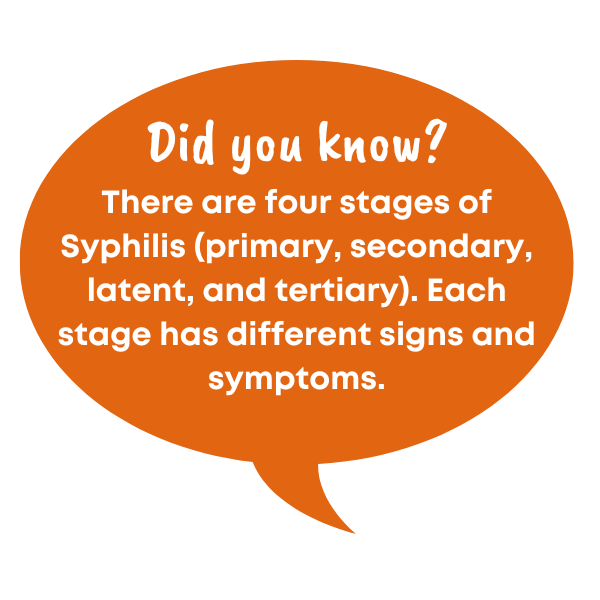Syphilis Facts
Syphilis is a sexually transmitted infection (STI) that can cause irreversible damage to the body when left untreated. Diagnoses of Syphilis has been steadily increasing over the past 5 years in Colorado.
Syphilis is a bacterial infection, caused by the bacteria Treponema pallidum.
While curable with antibiotics, complications that may develop in later stages cannot be reversed with treatment, including serious damage to the brain, heart, nervous system, and even death.
It is most easily spread during the first (primary) stage because symptoms usually go unnoticed.
Syphilis can be transmitted to an infant during pregnancy and childbirth.

Syphilis cases continue to rise in Colorado
Colorado is experiencing an epidemic in syphilis cases: a three-fold increase in all stages and a seven-fold increase in congenital syphilis. The number of stillbirths and fetal deaths in early 2024 require urgent action. Timely testing and treatment during pregnancy can help prevent this.
The following individuals should be tested for Syphilis:
- All sexually active people between the ages of 15 and 44 years, and any person being evaluated for a sexually transmitted infection.
- All pregnant people three times: at the first prenatal visit, early in the third trimester, (28-32 weeks gestation), and at delivery.
- If there’s a miscarriage after 20 weeks or stillbirth.
- If someone who is pregnant goes to an urgent care center or emergency room, at the intervals and events described above.
- All pregnant people in all correctional facilities and juvenile detention centers.
- Sexually active men who have sex with men (MSM), tested at least annually.
- Sexually active people living with HIV, tested at least annually.
- Infants born to any person who did not have prenatal care or syphilis screening prior to delivery before discharging from the newborn nursery.
What are the symptoms
Syphilis can be passed on when infected lesions come in contact with the soft skin of the mucous membrane found inside the vagina, urethra or with an abrasion during vaginal, oral and anal sex, even if there is no sexual penetration. Symptoms by stage include:
Primary Syphilis:
Chancre: The primary stage of Syphilis is usually marked by the appearance of a single sore, known as a chancre, within 10 to 90 days after contact with the bacteria at the site of infection. It is usually appears as a single, painless sore, that is raised or elevated.
Chancres may be found: outside the genitals, including the penis, scrotum and vagina; inside the vagina or rectum; at or around the anus; or, on the lips or in the mouth, though this is not as common. The sore can last from three to six weeks.
The chancre will go away with or without treatment. Without treatment, the person will still have Syphilis and can transmit it to others.
Secondary Syphilis:
The secondary stage of Syphilis can develop 17 days to 6 1/2 months after infection.
Symptoms can last from 2 to 6 weeks.
Symptoms can include: a rough, reddish-brown rash that appears on the palms of your hands or the soles of your feet, which normally does not itch; rashes on other parts of the body, including the neck, head and torso; condylomata lata or Syphilitic “warts”, moist, raised or elevated skin lesions, may be found in the anus or genital area; “mucous patches,” flat, round, grayish-white sores, can appear on the mouth, throat, and cervix; patchy loss of hair on the head and other parts of the body; or, a general sense of ill health.
Symptoms of secondary Syphilis will clear up with or without treatment, but the disease will still be present if untreated. It will then enter into a latent stage, which has no signs or symptoms.
Latent Stage:
Latent Syphilis is defined as the time where there are no signs or symptoms of the disease
Develops from two to 30+ years after infection.
Because there are no signs or symptoms, the only way to test for infection during the latent period is by blood test.
A relapse of secondary Syphilis can occur once the disease has entered the latent stage. This normally will happen during the first two years of latency.
Late Stage (Tertiary):
Symptoms of late stage or tertiary Syphilis can occur 2 to 30+ years after infection.
Complications during this stage can include: gummas (small bumps or tumors that can develop on the skin, bones, liver or any other organ), problems with heart and blood vessels, or chronic nervous system disorders, such as blindness, insanity and paralysis.
If treated during this period, gummas will usually disappear. Though treatment at this phase will cure the disease and stop future damage to the body, it cannot repair or reverse the damage that occurred before treatment.
Congenital Syphilis:
A person infected with Syphilis can pass the disease to their unborn child, either during pregnancy or in childbirth. A newborn infected in this manner has congenital Syphilis.
Early signs generally appear from three to eight weeks after a baby is born.
Even though these symptoms develop soon after birth, most cases go unnoticed until late congenital symptoms appear in childhood or adolescence.
Late congenital Syphilis has similar symptoms to tertiary Syphilis in adults, though heart complications rarely occur in cases of congenital Syphilis
How can I protect myself
If you are sexually active, the following things can lower your chances of getting Syphilis:
Consider a mutual monogamous relationship with a partner who has been tested and does not have Syphilis.
Get tested prior to engaging in a sexual relationship.
Use a latex condom. Condoms can reduce your risk of contracting syphilis, but only if the condom covers the Syphilis sores.
Tell me more about testing and treatment
Most of the time, healthcare providers will use a blood test to test for Syphilis. Some will diagnose Syphilis by testing fluid from a Syphilis sore.
Syphilis is curable with the right antibiotics from your healthcare provider. However, treatment might not undo any damage the infection can cause.
Having Syphilis once does not protect you from getting it again. Even after successful treatment, you can get Syphilis again. Only laboratory tests can confirm whether you have Syphilis. Follow-up testing by your healthcare provider is necessary to make sure your treatment was successful.

Learn more STI facts and news on the CDC website.
